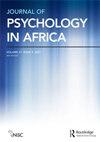Sense of power and online trolling among college students: Mediating effects of self-esteem and moral disengagement
IF 0.8
4区 心理学
Q3 PSYCHOLOGY, MULTIDISCIPLINARY
引用次数: 0
Abstract
This study investigated the relationship between the sense of power and online trolling among college students and the role of self-esteem and moral disengagement in that relationship. Participants were 1 268 college students (females = 61.6%, mean age = 19.94, SD = 2.07 years). The students completed the Sense of Power Scale, the Self-esteem Scale, the Chinese Version of the Moral Disengagement Scale and the Global Assessment of Internet Trolling. The results from the regression analysis and the mediation effect showed that students with a higher sense of power were less likely to engage in online trolling. Moral disengagement mediated the relationship between a sense of power and online trolling to be higher in trolling. The chain mediating effect of self-esteem and moral disengagement between the sense of power and online trolling was significant, so students with a low sense of power also had lower self-esteem and higher moral disengagement. These findings are consistent with structural power theory, which contends that people with a low sense of power do not regard moral standards and are more likely to engage in online trolling.大学生的权力感与网络攻击:自尊与道德脱离的中介效应
本研究调查了大学生的权力感和网络钓鱼之间的关系,以及自尊和道德脱离在这种关系中的作用。参与者为1268名大学生(女性=61.6%,平均年龄=9.94,标准差=2.07岁)。学生完成了权力感量表、自尊量表、道德脱离量表中文版和网络钓鱼全球评估。回归分析和中介效应的结果表明,权力感较高的学生参与网络钓鱼的可能性较小。道德脱离介导了权力感和网络钓鱼之间的关系,使其在钓鱼中更高。自尊和道德脱离在权力感和网络钓鱼之间的连锁中介作用显著,因此权力感低的学生自尊也较低,道德脱离较高。这些发现与结构性权力理论一致,该理论认为,权力感低的人不尊重道德标准,更有可能参与网络钓鱼。
本文章由计算机程序翻译,如有差异,请以英文原文为准。
求助全文
约1分钟内获得全文
求助全文
来源期刊

Journal of Psychology in Africa
PSYCHOLOGY, MULTIDISCIPLINARY-
CiteScore
1.70
自引率
16.70%
发文量
62
期刊介绍:
Findings from psychological research in Africa and related regions needs a forum for better dissemination and utilisation in the context of development. Special emphasis is placed on the consideration of African, African-American, Asian, Caribbean, and Hispanic-Latino realities and problems. Contributions should attempt a synthesis of emic and etic methodologies and applications. The Journal of Psychology in Africa includes original articles, review articles, book reviews, commentaries, special issues, case analyses, reports and announcements.
 求助内容:
求助内容: 应助结果提醒方式:
应助结果提醒方式:


